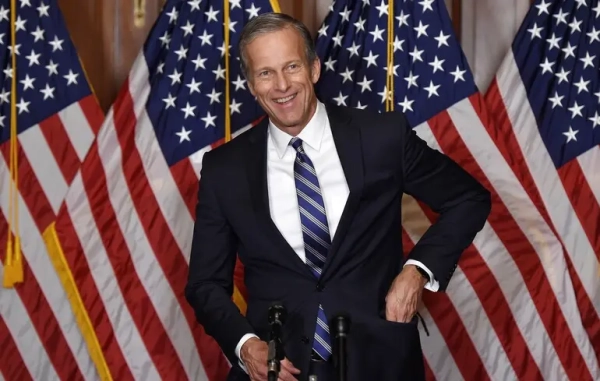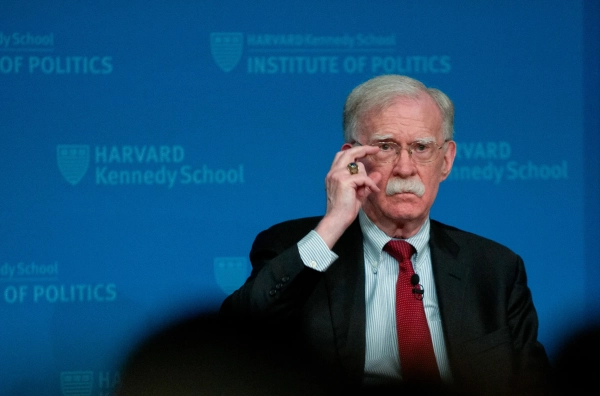
Over the past few days, Trump waded into the spat between House Speaker Nancy Pelosi and Reps. Alexandria Ocasio-Cortez, Ilhan Omar, Ayanna Pressley, and Rashida Tlaib — “the Squad.” The fight between the Democratic leadership and the group of progressives was getting out-of-hand, with accusations of racism and increasing inflammatory sniping from anonymous aides. Trump, in a blaze of tweets, neatly united the Democrats at a moment when their divisions threatened to deepen into schisms. Now, instead of fighting with each other, House Democrats are voting to censure the president for racist remarks. Perhaps Pelosi owes him a gift basket.
But in unifying House Democrats against him, Trump unified them around the Squad, and raised their profile — the four women are getting even more coverage this week than they were last week, exactly what Pelosi was trying to avoid, and exactly what conservative media has been trying to achieve.
There are two ways of thinking about this outcome. One cuts American politics into the traditional Republican-Democrat divide. In this telling, Pelosi and the Democrats are Trump’s foremost antagonists, and in bridging their divides, he weakened himself. The other views American politics through the lens of demographic change and the white identity politics it triggers. In this view, by uniting Democrats in defense of the Squad and against his racist attacks, Trump rescued a narrative crucial to his political appeal and the reactionary politics he represents.

Let’s back up. This controversy started with a series of calculated comments by Pelosi meant to diminish the Squad. “All these people have their public whatever and their Twitter world,” Pelosi told the New York Times. “But they didn’t have any following. They’re four people and that’s how many votes they got.” Unlike Trump, Pelosi chooses her words with care, so notice the argument she was actually making. The idea was that their centrality in social media, and on cable news, is misleading. They get retweets, but they can’t command votes. Their power is illusory, and thus their coverage unmerited.
This reflects a particularly deep source of frustration House Democrats feel toward the Squad. From the perspective of most House Democrats, who claw and scrap for press coverage, and the House Democratic leadership, which tries desperately and ineffectually to coordinate messaging, the Squad is composed of four backbench, first-term members who don’t lead committees, represent swing districts, or control big blocs of votes. And yet every time you turn on the TV, or read an op-ed, or fire up Twitter, there’s the Squad.
Much of this — and this is important — reflects the Squad’s appeal in conservative media circles. In February, Media Matters analyzed Fox News coverage and found that Ocasio-Cortez, then a brand-new member of the House, received four times the mentions of Senate Majority Leader Mitch McConnell. In a separate study, they found Fox News mentioned AOC more than 3,000 times in a six-week span. Watch this supercut. It’s dizzying.
There’s a reason conservative media focuses relentlessly on Ocasio-Cortez, and to a lesser but still disproportionate extent, Tlaib and Omar. Vilifying nonwhite, female members of Congress electrifies their audience is a way that vilifying, say, Rep. Richard Neal, the powerful but bland chair of the House Ways and Means Committee, does not. The strategy of Fox News and much of the conservative media is to activate white threat in a browning America. Elevating and demonizing extremely liberal, nonwhite, young, female politicians is one way they do it.
This isn’t to take anything away from the Squad’s authentic support. They’ve built huge online followings as digitally savvy champions of an unapologetic left — a Twitter analysis show Ocasio-Cortez gets more retweets than any politician save Trump, and her per-follower engagement beats his handily — and they’re masterful at using their social media sway to set the news and political agenda. The Green New Deal, for instance, wouldn’t be a defining issue of this era without Ocasio-Cortez’s advocacy.
The Squad is also native to the era of polarization, and quick to use the attacks against them to counterpunch and further raise their profiles. As a result, they generate tremendous coverage on the left and the right, and then even more coverage when they’re at the center of left-right conflict. The rest of the House Democrats are stuck watching from the sidelines, boiling with resentment.
This is the context not just for Pelosi’s comments, but for the weird poll that Democratic officials apparently leaked to Axios to emphasize the damage Ocasio-Cortez was supposedly doing to the party. The poll was of non-college educated white men, and the post-publication controversy has swirled around whether it’s appropriate to call this group, which went heavily for Trump, “swing voters.”
But more telling was the framing of the poll by whoever leaked it. The Axios headline read “AOC defining Dems in swing states,” even though the results didn’t include any data to that effect. What the poll did show was that 74 percent of the respondents knew of Ocasio-Cortez, and 53 percent knew of Omar. How many other House Democrats have that kind of name recognition?
“If all voters hear about is AOC, it could put the [House] majority at risk,” an anonymous “top Democrat” told Axios. “[S]he’s getting all the news and defining everyone else’s races.”

This is what House Democratic leadership fears: that Ocasio-Cortez and the Squad, through their dominance of social media and their centrality on conservative media, will become the faces of the House Democratic majority. Centering American politics on the rising power of unapologetically liberal, young, nonwhite politicians is the right’s best hope for holding power: As reams of research show, when white Americans believe themselves losing demographic and political control of the country, they become far more conservative.
Enter Trump, and his plainly racist tweets telling the Squad to go back where they came from, despite the fact that three of four were born in America, and the fourth came here as a child and is a citizen. Later, Trump was asked whether he was worried that his comments were seen as racist and celebrated by white nationalists. In a reply that stands as a perfect encapsulation of his entire political career, he said, “It doesn’t concern me because many people agree with me.”
Trump took a fight House Democrats were having with each other and turned it into a fight they are now having with him. In doing, he rallied House Democrats around the Squad, and made himself the Squad’s chief opponent. “The Dems were trying to distance themselves from the four ‘progressives,’ but now they are forced to embrace them,” Trump tweeted. “That means they are endorsing Socialism, hate of Israel and the USA! Not good for the Democrats!”
This is the fight Trump, for better or worse, wants. He has always been more animated by the demographic divide than by the party divide; his eagerness to attack the Squad, even if it means uniting the Democrats, reflects his true political project: not conservatism, but white identity politics.
Still, white identity politics are powerful in a majority-white country undergoing rapid demographic change. This whole fracas began with Pelosi trying to push the Squad off center stage. It ended with them yet more in the spotlight. And that reflects a core dimension of the Squad’s notoriety: not the retweets and support they receive on the left, but the constant promotion and demonization they receive from the right. This was always the flaw in Pelosi’s plan: whatever she said to the New York Times, she wasn’t going to push the Squad out of the spotlight, because the voters she’s most concerned about aren’t following Ocasio-Cortez’s Twitter feed, they’re feeling the reverberations of Fox News.
It’s a dynamic the Squad recognizes. “I encourage the American people and all of us in this room and beyond to not take the bait,” Pressley said of Trump’s remarks about, well, her. “This is a disruptive distraction from the issues.”
Sourse: vox.com






